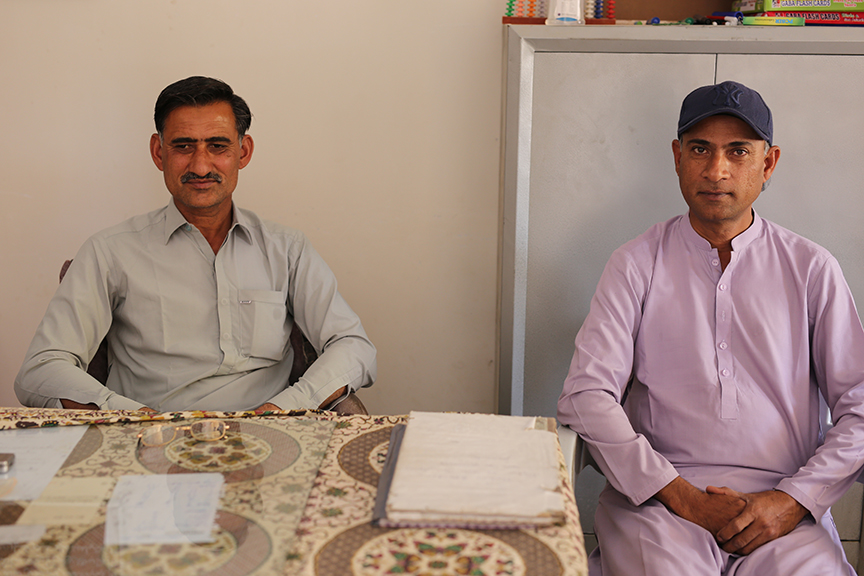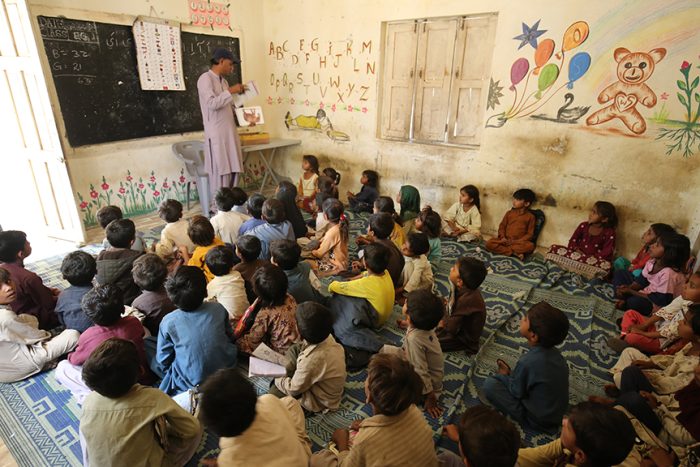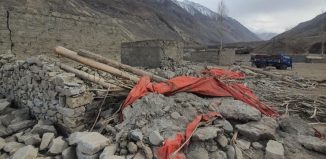Building Dreams for a Better Future
Not far from Umerkot town, Janhero is a large village with 10,000 people. At the time of partition, it likely had around one-fifth of that number. Nevertheless, it caught the attention of a dedicated officer from the Education Department, leading to the establishment of the first primary school here in 1948. Among its alumni are several doctors, custom officers, a senator and an officer in the National Accountability Bureau, which Ahmed Ali, the headmaster, recounts with visible pride. In addition to this school, the village now has three other girls’ schools and seven boys’ schools. However, since its inception, the Government Boys Primary School has been a co-educational institution currently having a total of 250 pupils, of which 80 are girls.

Ahmed Ali, himself an alumnus, emphasises that there never was a tradition of corporal punishment at the school. However, the Early Childhood Care and Education, Positive Learning Environment and Inclusive Environment trainings he undertook with Community World Service Asia (CWSA) in 2023, had a considerable impact on his teaching methods. Even before applying what he learned, he passed on his training to his colleagues and today all four government teachers at the school are properly trained.
“Earlier, the system was to read a lesson from the textbook and instruct the children to learn it at home. Rote was the method, there was no emphasis on understanding. Also, the students were never involved in the learning process. But now we invite the children to ask questions and play roles,” says Ahmed. He adds that though there are Hindu and Muslim students, there is no religious prejudice in his school.
The partnership between Community World Service Asia and Act for Peace (AFP) made the training possible and provided an additional teacher. Young Abdul Ghaffar is an artist in his spare time and he was lucky the village had many schools which occasionally called upon him to paint murals on classroom walls. However, this work was sporadic with gaps in between. Since the reopening of the school after the summer break in 2023, he has secured a regular teaching position with a stable salary, thanks to the education team’s intervention. This has made life easier for him and his dedication has benefited the school and its students.
“More than the pay, it is the sense of achievement I have interacting with my nursery class,” says Ghaffar. “From being unlettered, I have seen children progressing in these past seven months into forming letters and figures and when I draw something on the board, they copy it with so much joy.” He adds that when he informed the children he would leave when the project ended, they all clamoured for him to stay. That, surely, is the best feedback any teacher could ask for.
Ahmed Ali notes that the school has received two rounds of hygiene kits for the students, with the second distribution taking place in January. Since the formation of the hygiene society in school and the students being tasked with ensuring personal cleanliness, there is a clear difference compared to before CWSA’s intervention. The students can now demonstrate the proper way to wash their hands. Ahmed points out that since the first distribution of the kits, the old practice of using dust or clay to cleanse the hands has nearly disappeared. He has observed that his students now encourage their families to always keep soap in the house.
Twelve-year-old Farhan’s father, Yunis, was a teacher at this same school before retiring to run a small grocery store. The boy wants to follow in his father’s footsteps and become a teacher. But Yunis thinks his son should become a police officer, which Farhan wryly recounts. He wants to teach because there are few teachers in his school. His favourite subjects are Sindhi, Science and Islamiyat. For now, Farhan aims to complete twelve grades, the minimum level of education required to join the police but hopes to eventually persuade his family to support his dream of attending university to train to become a teacher.
Ten-year-old Heer speaks clear, unaccented Urdu. Her father, a journalist and president of the local press club, often plays Urdu news bulletins on the television at home, which has helped her language. She enjoys Science and Maths and wants to become a doctor so that she can run a clinic in the village and provide quality treatment to people who currently have to travel to Umerkot when ill.

Arooj Fatima, whose father is a teacher in a neighbouring village, also wants to become a doctor. But unlike Heer, she is quite clear that she will have a clinic in Hyderabad so she can make some money as well. Though both girls say they are proficient in maths, they do not consider engineering a career.
Ten-year-old Bhawani Shankar is also focused on his future. His father, a master bricklayer, has advised him to become a customs officer. Bhawani understands that this will require hard work and a college degree, but he is determined to pursue it for his parents’ sake. When asked how his Urdu is so clear, he credits it to attending school.
The bell rings for the mid-morning break and headmaster Ahmed Ali shows the students at play outside. Activities like badminton, hula hoops, and skipping ropes fill the schoolyard with colour and joy as children use equipment they have not seen before. The headmaster said that this was part of the education project by CWSA and AFP. Previously, the school had no sports equipment and students were discouraged from making noise during the breaks, he added.
According to Ali, before this initiative, the school only had a couple of footballs and a cricket bat, used exclusively by boys. Although girls shared classrooms with boys, they did not play with them and often stayed inside. The new variety of sports equipment encouraged girls to participate in games.

These youngsters’ ambitions and dreams are a sign of the impact of the education they receive. Many children have previously completed high school without a vision of their future. This small initiative by AFP and CWSA to improve the education system in remote Janhero represents a major leap forward for the village’s children.
Such progress would hardly have been possible without the Village Management Committee (VMC). Elderly Laxman, an active member of the VMC, emphasises his role in enrolling around 50 out-of-school children. When the education project began, he went door to door, often hearing the same response: that children had to participate in farm labour alongside their parents. “I told them it is education that will break the shackles of their poverty, not farm labour they have done through countless generations. An educated child stands every chance of getting a respectable job. But if they force their children into labour, the cycle will continue,” says Laxman. He now maintains a directory of parents’ phone numbers and to follow up if a child misses school.
The VMC also supports 12 children who are either orphans or from poor families as they cannot afford school supplies. Laxman says that several better-off committee members pool resources to provide these children with the necessary materials. Additionally, the VMC financially assists the few village youngsters who have reached university.
“The committee’s biggest success surely is getting out-of-school children enrolled and ensuring that students do not leave the village with their parents on the seasonal harvest migration,” says Laxman. It is now ensured by the committee that one or two members of every migrating family remain behind to ensure that children do not drop out of school.







